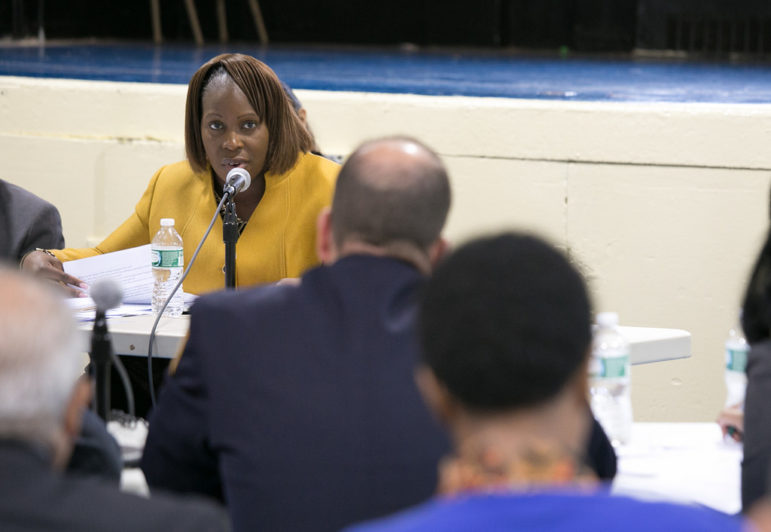
William Alatriste for the New York City Council
Gibson says she is unsure if the appropriate policy goal is to retain all the auto businesses currently in the footprint of the proposed rezoning, or defend a smaller segment of the industry.
On Wednesday, Bronx City Councilmember Vanessa Gibson announced she would introduce legislation to create additional outreach and protections for auto repair shops, including the ones in her district on Jerome Avenue, which the city hopes to rezone.
Her announcement came on the heels of a report by the Pratt Center that found many of Mayor de Blasio’s proposed neighborhood rezonings overlap with auto-repair shop clusters and could potentially displace businesses and harm a mostly immigrant workforce. The report also noted that businesses operating in a building without correct certificates of occupancy for an auto repair are especially vulnerable to displacement.
Gibson’s legislation, which has Brooklyn Councilmember Robert Cornegy’s backing, would tackle the certificate of occupancy issue by mandating that before a landlord signs a lease to rent to an auto shop, the landlord must show the space’s certificate of occupancy and disclose whether there any outstanding tax liens or fines on the property. The legislation would also require the Department of Small Business Services to conduct more outreach to auto-repair shop owners about setting up their businesses, and provide educational materials in six languages.
According to Pedro Estevez of the United Auto Merchants Association, many landlords to do not acquire the correct certificate of occupancy because of the time and money it takes to get the certificate, and because if the landlord desires to shift to another, more profitable commercial use, they would need to apply to switch the certificate. The consequences fall on the auto shops, which can face trouble getting licenses, be subject to fines and potentially be shut down after years of investing in their spaces.
It gets even worse in the event of a rezoning. Landlords have less incentive to get the correct certificates, given that they could make money down the line by redeveloping their spaces as housing or for other commercial uses. And even if the landlord decides to keep their auto shop, were an inspector to discover the lack of an appropriate certificate of occupancy, that would be bad news for the auto-repair business: In areas that have been rezoned for housing, it would be even more difficult than it already is to obtain a new certificate of occupancy for an auto shop that is no longer permitted as-of-right.
Under Gibson’s legislation, because landlords would be required to inform potential tenants about whether they had the correct certificate of occupancy, auto-shop owners could make informed decisions when renewing a lease or relocating to a new space.
The bill wouldn’t help auto shops that are already stuck leasing from landlords without the proper certificate. Gibson says she’s working with advocates to figure out if any measures can be introduced into the bill to help tenants in such a situation.
And the bill won’t eliminate the displacement pressures that a rezoning creates by promoting uses like housing and commercial retail, which can out-compete auto-shops for rent. Gibson explained that she’s still determining what would be the best rezoning strategy that would allow for housing growth on Jerome Avenue without displacing the area’s auto repair shops and other small businesses.
“We want to make sure there’s diversity in terms of residential and commercial, but the challenge for us is identifying how many auto businesses we want to fight for. Do we fight for all of them? Do we provide a relocation package for those that choose to leave?” she said. “My job is to fight for every auto business that wants to stay, and I am going to continue to remain firm on that.”
Other groups involved in discussions of the Jerome Avenue rezoning have already put forward a variety of demands related to the auto industry. The Bronx Coalition for Community Vision has called on the city to expand “retention areas”—those parts of the avenue that will not be rezoned for housing development. It has also asked for the city to use zoning regulations to ensure auto businesses are protected from competing, higher-value commercial uses and to find ways to limit commercial rent increases.
And last but not least, it has asked the city to come up with a thorough relocation plan for businesses that must go, including giving displaced businesses a “right to return” to spaces in new developments.
Estevez, who sees the rezoning as inevitable, is more focused on the latter—a robust relocation plan. He’d like the city to help find a private space in an Industrial Business Zone that could become a vertical auto-shop mall for displaced auto businesses. He also wants to see the city provide additional education to auto-shop owners about city regulations and training to autoworkers to ensure they know the latest car technology.
And he hopes this relocation plan will go more smoothly than it did for workers in Willets Point, who have been held up by their new building’s difficulty obtaining a certificate of occupancy.








